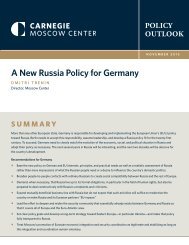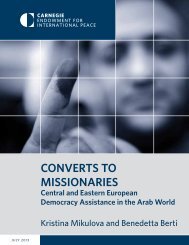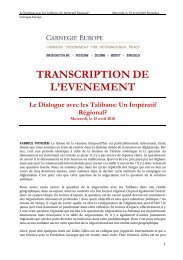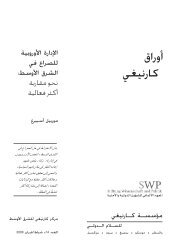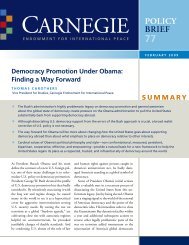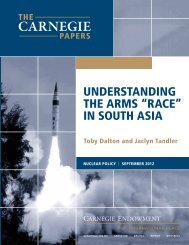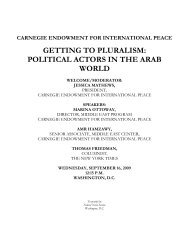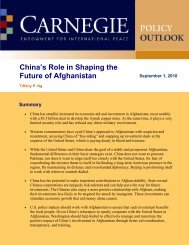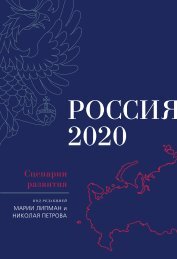Full Text (PDF) - Carnegie Endowment for International Peace
Full Text (PDF) - Carnegie Endowment for International Peace
Full Text (PDF) - Carnegie Endowment for International Peace
Create successful ePaper yourself
Turn your PDF publications into a flip-book with our unique Google optimized e-Paper software.
Bogdanchikov has started thinking in this direction long ago. He said in February 2004: “I<br />
believe we should give an even more careful consideratio n to the issue of <strong>for</strong>eign involvement in<br />
our oil industry. It might even make sense to think about limiting the acquisition of major stakes<br />
in Russian companies by <strong>for</strong>eigners. Let them invest in production sphere rather than in the stock<br />
market: let them win a license under general terms and work.” 62<br />
Not surprisingly, his tough stance reflects the general sentiment of “oil and gas patriotism” that<br />
is getting increasingly stronger in Russia. The usual Russian xenophobia is particularly visible in<br />
the case of the oil and gas sector: according to the recent public opinion polls made by Levadacenter,<br />
67% of population believes that <strong>for</strong>eigners should not be allowed any <strong>for</strong>m of control in<br />
the oil sector of Russia versus only 2% that accepts <strong>for</strong>eign involvement without any<br />
limitations. 63<br />
Bogdanchikov’s thoughts about the role of <strong>for</strong>eign companies in the oil sector of Russia were<br />
reflected in his deeds. In 2003, Rosneft won a war <strong>for</strong> the Vankor oil field when it defeated both<br />
YUKOS and TOTAL. Eniseineft created in 1992 won a license <strong>for</strong> Vankor in a tender held in<br />
1993. 64 In 2000, YUKOS joined the game by acquiring the controlling interest of East-Siberian<br />
Oil and Gas Company, a parent company of Eniseineftegasgeologiya and Eniseigeophysica.<br />
In the early 2002, TotalFinaElf conducted negotiations with the administration of the<br />
Krasnoyarsk region, Eniseineft and Anglo-Siberian Oil Company (ASOC) about its participation<br />
in the development of the field. A year later, TOTAL reached an agreement on buying 52% out<br />
of 59% of Eniseineft owned by ASOC. In February 2003, TOTAL said that it was ready to invest<br />
$2.5-3 bln in the development of Vankor over two years. However, soon after that, Rosneft<br />
bought ASOC <strong>for</strong> $80 million and became owner of a 59% stake in Eniseineft.<br />
Wishing to secure its control over the field TOTAL tried to use “the administrative resource,”<br />
i.e. its friendly relations with the Krasnoyarsk Region administration. However, it discovered to<br />
its chagrin that Rosneft possessed “administrative resource” of the federal level. 65 Some experts<br />
believe that the lengthy negotiations between Rosneft and TOTAL on joint projects were<br />
unsuccessful mainly because TOTAL was insisting on a 50% shareholding. Also, to the<br />
annoyance of Rosneft, the French major tried to put pressure on the Russian company by sending<br />
letters to the RF Government, including to the Ministry of Foreign Affairs. 66<br />
After Rosneft bought ASOC, disputes with YUKOS continued; to resolve them, Rosneft had to<br />
turn to the General Prosecutor Office <strong>for</strong> assistance accusing Khodorkovskiy of stealing 19% of<br />
shares of Eniseineftegas (shareholder of Eniseineft). Having gotten rid of the rivals, Rosneft<br />
started drilling at Vankor field in March 2004.<br />
Rosneft fought so hard <strong>for</strong> Vankor not only to expand its reserve base. By buying ASOC it did<br />
not permit Vankor to pass under the control of a <strong>for</strong>eign major. Had it happened, a new channel<br />
of oil export not controlled by Transneft (read - the state) could have emerged. Vankor, in<br />
contrast to other oil and gas projects of East Siberia, is not irreversibly linked to the Pacific Rim<br />
markets. Liquid hydrocarbons of the Krasnoyarsk region could be shipped along the Northern<br />
Sea Route, which would permit to avoid Transneft's bottlenecks and diversify markets <strong>for</strong><br />
62<br />
Oil and Gas Vertical, # 16, 2004, p. 21.<br />
63<br />
Vedomosti, 29.08.05.<br />
64<br />
Eniseyneft's Russian founders were state enterprises Eniseineftegasgeologiya (22%) and Eniseygeophisika (15%),<br />
as well as the administration of the Turukhansk region (4%). The <strong>for</strong>eign investor of Eniseineft was Anglo-Siberian<br />
Oil Company.<br />
65<br />
See in greater detail N.Simonia, Russian Energy Policy in East Siberia and the Far East. Baker Institute<br />
Publications, 2004.<br />
66 NefteCompas, April 24, 2003, p.4.<br />
16




